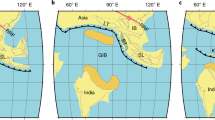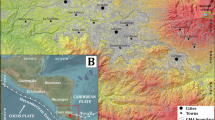Abstract
THE massive fault-block of the Ruwenzori Mountains, which lies on the axis of the Western Rift between Uganda and the Congo, is the wettest of the high mountain areas in East Africa. For that reason it has more glaciers at present and has been more extensively glaciated in the past than any of the other tropical African mountains. Although relative ages have been estimated1,2, no absolute dates have been published for prehistoric glacial events in this or any other tropical African mountain area.
This is a preview of subscription content, access via your institution
Access options
Subscribe to this journal
Receive 51 print issues and online access
$199.00 per year
only $3.90 per issue
Buy this article
- Purchase on Springer Link
- Instant access to full article PDF
Prices may be subject to local taxes which are calculated during checkout
Similar content being viewed by others
References
Nilsson, E., Geografiska Annaler, 13, 249 (1931).
de Heinzelin, J., Explor. du Parc Nat. Albert, 2iěme Sér., 1, 1 (1953).
van der Hammen, Th., Ann. N.Y. Acad. Sci., 95, 1, 676 (1961).
Bakker, E. M. van Zinderen, Nature, 194, 201 (1962).
Author information
Authors and Affiliations
Rights and permissions
About this article
Cite this article
LIVINGSTONE, D. Age of Deglaciation in the Ruwenzori Range, Uganda. Nature 194, 859–860 (1962). https://doi.org/10.1038/194859b0
Issue Date:
DOI: https://doi.org/10.1038/194859b0
This article is cited by
-
Physical and chemical limnology of alpine lakes and pools in the Rwenzori Mountains (Uganda–DR Congo)
Hydrobiologia (2007)
-
Temperature depression in the lowland tropics in glacial times
Climatic Change (1996)
-
Quantitative estimates of full glacial temperatures in equatorial Africa from palynological data*
Climate Dynamics (1992)
-
History of climate and forests in tropical Africa during the last 8 million years
Climatic Change (1991)
Comments
By submitting a comment you agree to abide by our Terms and Community Guidelines. If you find something abusive or that does not comply with our terms or guidelines please flag it as inappropriate.



